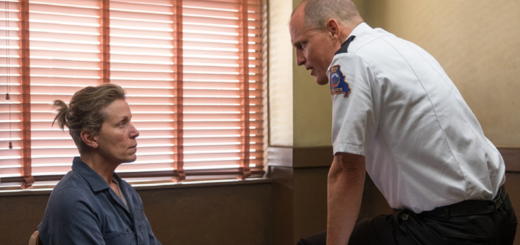‘Master of None’ Means Well When It Addresses Feminism … But Aziz Ansari Should Stick to His Own Experiences

By JORDAN ECARMA
This weekly column analyzing how women are portrayed in media is what happens when you’re a conservative feminist who loves movies (and TV). Feminism often uses the Bechdel test as a metric: Does this movie have a scene where two women with names talk about something other than a guy? The point of the test is not “movies that pass this are feminist”—it’s “this is the absolute base point of whether or not women are their own people in this movie.” I attempt to go a little further each week with a deeper analysis.
Editor’s note: Season 1 spoilers.
“Master of None” is essentially out to be my generation’s “Friends”—30-somethings navigating life and love in New York City, but with fewer laughs and more existential crises.
Not that there aren’t some laughs as well as a lot to like in “Master of None”; if you enjoy Aziz Ansari’s standup, you’ll notice storylines and comedic bits plucked from his real-life experiences. These organic moments are the best parts of the show.
While I didn’t fall in love with the pilot, the second episode of “Master of None” won me over because it was uniquely relatable. Ansari’s Dev and his friend Brian (played by Kelvin Yu) try to learn more about their parents’ story. Both Dev and Brian are children of immigrants and enjoy a better life in America thanks to their parents’ sacrifice—something they attempt to appreciate in this particular episode.
As someone who is also an immigrant’s kid, I loved Dev and Brian’s sometimes successful and heartwarming, often awkward and humorous attempts to stop taking their parents for granted. “Master of None” also succeeds when Ansari points out the subtle racism still present in the entertainment industry with the episode “Indians on TV,” which shows Dev’s struggle at casting calls. Indian actors often have to audition for stereotypes and are required to have a thick (and fake) accent to score a role, while it’s considered unnecessary to have more than one Indian actor in the same TV show or film.
So far, so good. Ansari translates his own lived experiences to this Netflix original with flair.
But when it comes to feminism (the point of this column, after all), “Master of None” stumbles with its seventh episode, “Ladies and Gentlemen.”
The best sequence in the episode illustrates the contrast between being a woman walking home in New York City and being a man. Dev and his friend Arnold meander through the park after dark and take their time getting home. Their walk is juxtaposed with a female friend’s—as any woman who has lived in a big city knows, walking home is a nerve-racking experience whether or not anything actually happens. No woman wants to end up a murder or rape statistic. At the very least, women in New York City expect to be catcalled on the sidewalk (personally, I’ve never felt safe when strange men are yelling about specific body parts at me). In “Master of None,” Diana hurries home, keeping her phone in her hand ready to dial “911” if needed. She’s followed home by a guy who was harassing her at the bar and has to call the police (that one I haven’t personally experienced, thank goodness).
In the episode, Dev learns about harassment, stalking and other things that women commonly experience but men typically don’t have to worry about. The best scenes are the ones where women describe their experiences; for example, Dev’s girlfriend, Rachel, talks about how she can put a harmless photo of a sandwich on Instagram and get weird sexual comments simply because she’s a woman.
But “Master of None” unfortunately puts most of its feminist lines in Dev’s mouth, turning him into a kinda annoying know-it-all male feminist and making the episode uncomfortably heavy-handed.
Don’t worry … I’m not labeling Ansari “problematic” or any such nonsense.
In fact, I think “Master of None” is a very feminist show—not for the sake of that episode, but because of its prevalent female characters. Denise (Lena Waithe) and Rachel (Noël Wells) are in more episodes than any other character besides Dev and have Bechdel test-approved conversations with other women. They are also both unique, complex, intriguing characters (arguably, more so than any of Dev’s male friends). “Master of None” is delightfully inclusive, featuring both a racially diverse cast and a natural balance of male and female characters, standing out in an entertainment world where people are still realizing that women are half the population.
For better or worse, “Master of None” is an accurate representation of millennials … in both its faults and virtues. Millennials tend to alternate between heady optimism and existential cynicism. We are adventurous, curious and open-minded. But like Ansari’s Dev (and “Master of None” itself), millennials often struggle with a sense of purpose. They insist on finding the “perfect” life to feel complete—the dream job, the absolutely ideal soulmate, a checklist of accomplishments that may or may not be realistic.
Dev and his live-in girlfriend Rachel break up at the end of the show after a long-term relationship with many fulfilling moments because they’re not “100 percent sure” that they are perfect for each other. But Dev, Rachel and millennials in general would be better off if they embraced life and love as they are (raw and imperfect, yet precious) instead of chasing some 100-percent ideal that doesn’t really exist.
Jordan Ecarma is a former journalist now living the millennial dream: getting paid for writing Facebook statuses (that is, digital PR). She watches her use of the f-word (“feminism”) around conservatives and the c-word (“conservatism”) around feminists. Find her under @JordanEcarma.




As a male, I personally really enjoyed "Ladies and Gentlemen". The scene where Arnold and Rachel go to check out a couch and their negotiation plans get flipped was hilarious!